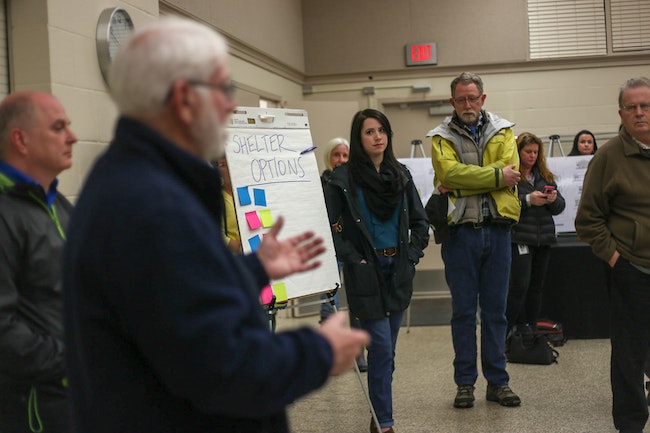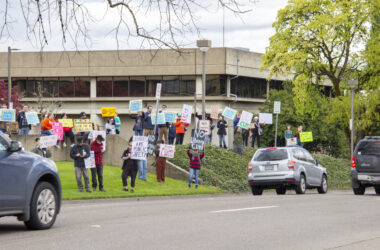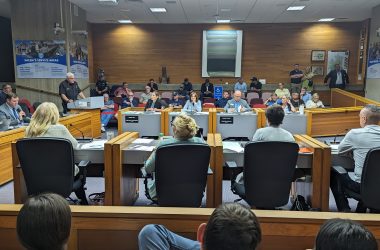 Mayor Chuck Bennett responds to questions from the a crowd of neighbors at Pringle Community Hall. The city scrapped plans to turn the hall into an emergency homeless shelter last month. (Troy Brynelson/Salem Reporter)
Mayor Chuck Bennett responds to questions from the a crowd of neighbors at Pringle Community Hall. The city scrapped plans to turn the hall into an emergency homeless shelter last month. (Troy Brynelson/Salem Reporter)
Each day Mayor Chuck Bennett opens his electronic inbox to a half dozen emails from downtown shoppers and business owners upset about the homeless people residing on sidewalks.
Feeling compelled to act, Bennett is pushing for a ban on sitting or lying on sidewalks during the day to deal with the 50 or so people camping in front of Rite Aid on Northeast Liberty Street.
He said the campers have no incentive to move on, and a new city law, recommended by both Salem Police Chief Jerry Moore and City Manager Steve Powers, would provide that.
“There are places that people can go during the day,” Bennett said, citing city parks, the library and day rooms at The ARCHES Project and Union Gospel Mission.
Bennett spent a quarter of his annual State of the City speech addressing homelessness, doubling down on the need for a sit-lie ordinance that keeps people off the sidewalks from 7 a.m. to 9 p.m. He listed the services the city provides to homeless people and mentioned future projects the city is trying to fund through the Legislature.
“In total, these responses remove any barrier or excuse for anyone to claim that camping on our community’s sidewalks represents a needed choice or situation,” Bennett told a crowd at the Salem Convention Center earlier this month.
Jimmy Jones, executive director of the Mid-Willamette Valley Community Action Agency, said many of the homeless people congregating downtown have health issues, like mental illness or limited mobility.
“Frankly a sit-lie ordinance will be very devastating for the downtown homeless community in part because it will make it exceptionally difficult for them to navigate their day-to-day existence,” Jones said.
He said the ban operates under the assumption that homeless people are going to spend their entire day at a day center or a park.
“That flies in the face of everything we know about how the homeless population moves around,” Jones said.
He pointed to other cities, like Spokane, that have enacted a ban but haven’t reduced the homeless population.
Jones said police will either get tired of enforcing it, or “enforcing it on a day-to-day basis is going to be resource intensive on a level I don’t think anyone is anticipating.”
According to preliminary numbers from the most recent survey, homeless service providers said there are 908 unsheltered people living in Salem and an additional 315 who are in shelter. Such counts historically undercount the homeless population because they can be hard to locate.
There are around 330 beds available on any given night, according to Jones.
Union Gospel Mission of Salem provides 150 beds for men, plus 48 extra mats from November through March. The organization’s Simonka Place has 100 beds for women and children.
Safe Sleep has beds for 10 women and Lighthouse Shelter, run by the Salvation Army, isn’t utilizing all its beds due to staffing issues. None provide shelter for people who have partners or pets or who are intoxicated.
Bennett said the shelter beds available in the city is a separate issue from the 50 people sitting underneath awnings on Liberty and Marion Streets.
“That’s a different and bigger question,” he said. “We are going to continue a concerted effort to deal with those long-term shelter and treatment needs for people who are actively looking for housing.”
Salem is seeking $7 million from the Legislature this session for a navigation center, a permanent shelter that would provide space for up 100 individuals.
But the threat of another Republican walkout that could stall legislative action could derail that funding.
On Monday, Feb. 24, the Salem City Council will consider the controversial sit-lie ordinance for a third time. Councilors rejected it in the past over concerns about its constitutionality.
In 2018, the 9th U.S. Circuit Court of Appeals ruled it unconstitutional to fine or jail homeless people for staying outside or in unauthorized places if a bed at an emergency shelter wasn’t available.
“As long as there is no option of sleeping indoors, the government cannot criminalize indigent, homeless people for sleeping outdoors, on public property, on the false premise they had a choice in the matter,” the court ruled.
City Attorney Dan Atchison assuaged councilor’s concerns about constitutionality of Salem’s camping ban at a Feb. 10 city council meeting. He said the current camping ordinance, which prohibits people from erecting tents and other structures for shelter on public rights of way, is not a criminal penalty and isn’t affected by the federal court decision.
He told councilors courts haven’t considered a daytime ban.
Under the sit-lie ordinance, Salem police would warn violators on first offense and could cite them for a second offense.
If those offenses occur in one of Salem’s exclusion zones — one is downtown and the other is in north Salem — a person could be banned from that area. A person who ignores the ban could be arrested for trespassing.
Powers said people have expressed concerns about where homeless people are supposed to go if they can’t find shelter along the sidewalk.
He mentioned day rooms, the library and shelters at city parks as viable alternatives.
Powers said he’s asked city staff to find out how much it would cost to re-open the bathroom at Marion Square Park, now closed due to damage.
He said the challenge is maintaining such facilities, noting that portable toilets have been burned down at the park.
Bennett said if the ban doesn’t pass, there’s a potential for an initiative campaign to pass the ordinance over the council.
“I think it’s something we need to do permanently,” Bennett said. “This will proceed as long as we allow people to park on our city streets during the day.”
Previous coverage:
Left with few options, the Salem City Council reconsiders banning sitting, lying on sidewalks
Mayor urges Salem City Council to pass sit-lie ordinance in annual address
Salem City Council approves sidewalk conduct ordinance without sit-lie aspect
Salem City Council to discuss ‘sit-lie’ ordinance in work session Monday
Downtown stakeholders split on ordinance to restrict sitting, lying on sidewalks
Salem considers banning daytime sleeping on sidewalks
Have a tip? Contact reporter Saphara Harrell at 503-549-6250, [email protected] or @daisysaphara.









